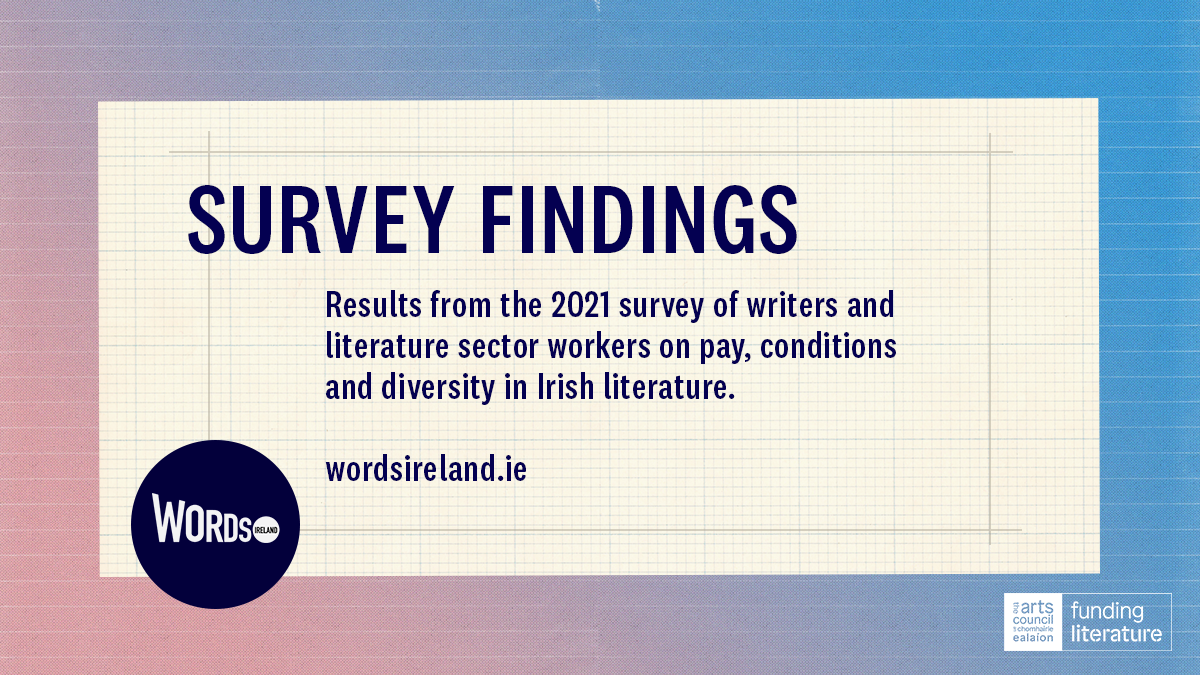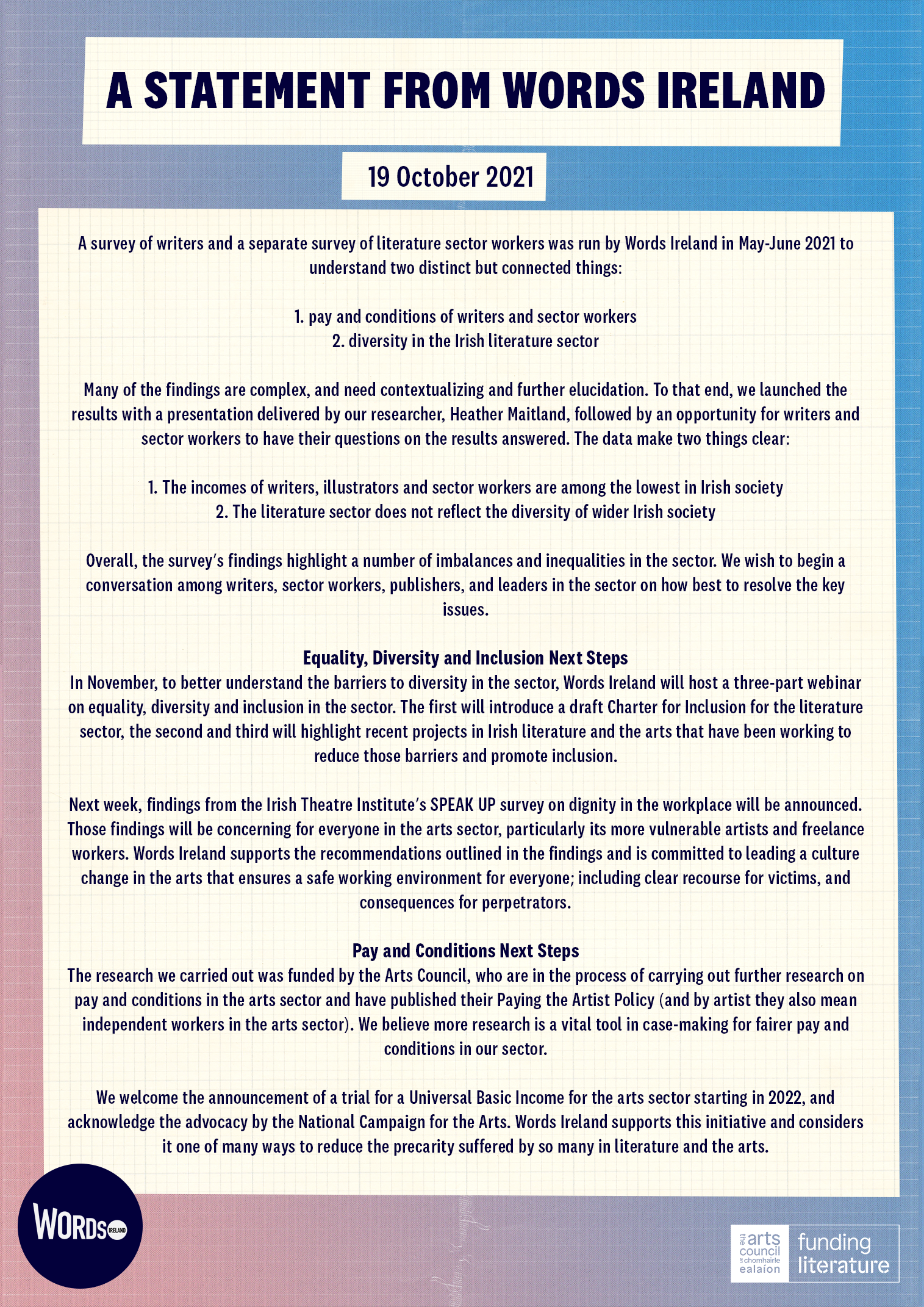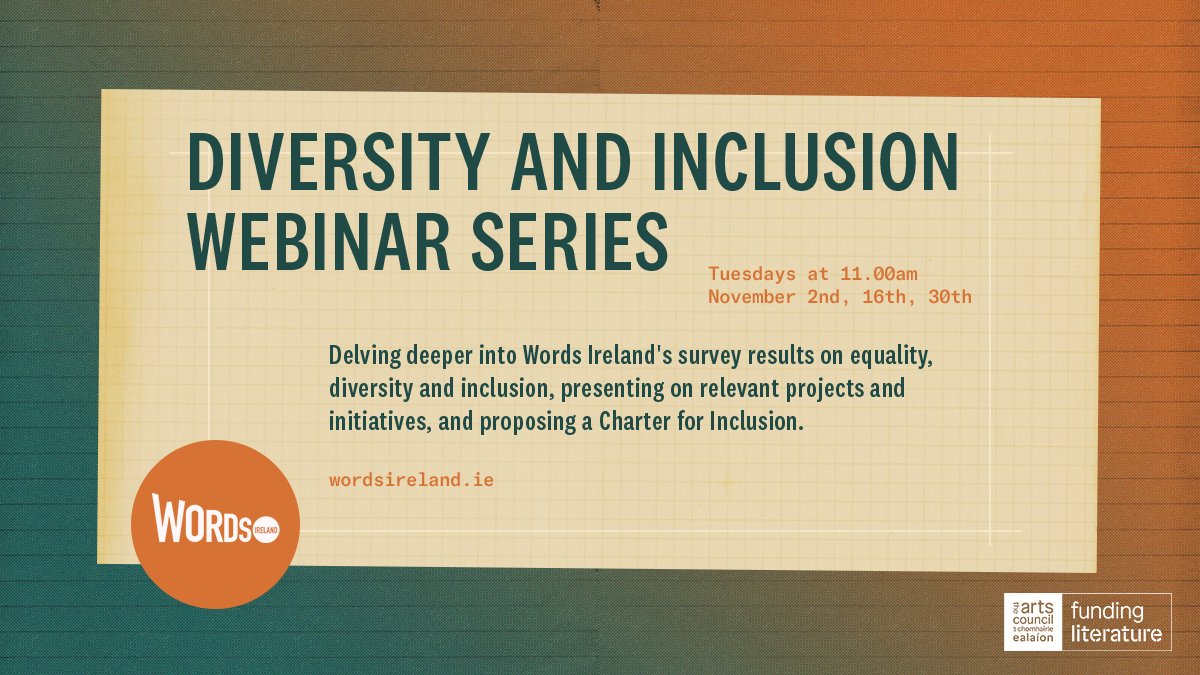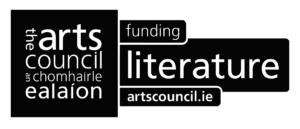Introduction
In May 2021, Words Ireland surveyed Ireland’s writers, illustrators and literature sector workers for the first time in over a decade. Over 500 people responded. On 19 October, Words Ireland delivered an online presentation of the headline findings, including information on pay, conditions and diversity in Irish literature. Commentary and contributions followed from writer Paul McVeigh, New Island Editor Aoife K. Walsh and Arts Council’s Strategic Development Manager, Toby Dennett.
Below, you’ll find:
- A Statement from the Words Ireland’s committee
- A link to the Survey Findings Presentation recorded on 19 October 2021
- Headline findings of the two surveys
- Info & Registrations details for our Diversity & Inclusion Webinar Series on 2nd, 16th and 30th November 2021
- More Information on this project
Headline Findings
Low annual earnings from all sources
38% of writers and illustrators and 50% of sector workers said that low pay was a barrier to further developing their careers.
The average annual earnings of Emerging, Mid-career and Established writers and illustrators from all sources was €25,622. This is less than two-thirds of the national average annual earnings for all employees in Ireland in 2019, including regular, overtime and irregular earnings, of €40,283. It is also less than the average for the Arts, entertainment and recreation sector of €26.318. Only the Accommodation and food sector earned less. Half of writers and illustrators earn less than €19,993 but 9% earned more than €60,000.
The average annual earnings of sector workers from all sources was €30,659, three quarters of the national average annual earnings.
Low income from creative work
The median gross income earned in 2019 by Emerging, Mid-career and Established writers and illustrators from their creative work in 2019 was €500. This means that half of them earned less than this. The median for Mid-career and Established writers and illustrators who might be expected to earn a substantial portion of their annual income from their creative work was €2,000.
“It takes an incredible amount of persistence to maintain this kind of career over a long period. Unless you’re in the top 1% (or smaller), trying to earn a full-time living is a big risk to take. Part of this comes from Ireland being a small market, as even bestsellers don’t make a lot of money.”
— Established writer/illustrator from an underrepresented group
Reliance on other sources of income
The median gross income earned by Emerging, Mid-career and Established writers and illustrators in 2019 from work related to their own writing or illustrating (e.g. events, teaching creative writing, residencies, journalism etc.) was €395. Mid-career and Established writers and illustrators earned a median of €1,000 from this type of work.
66% of respondents to the writers’ and illustrators’ survey from underrepresented groups and 72% of those not identifying as part of such groups said that their writing or illustrating was made possible by income from work not related to their writing or illustrating. The disparity is because migrants and lone parents of children under 12 are less likely to be able to undertake such work.
33% of respondents to the writers’ and illustrators’ survey from underrepresented groups and 24% of those not identifying as part of such groups said that their writing or illustrating was made possible by income from another member of their household, family or friends.
Social welfare
14% said that their writing or illustrating was made possible by social welfare benefits or payments. There was little difference between those from underrepresented groups and those not identifying as part of underrepresented groups because, as many are self-employed, they are not eligible for social welfare payments.
In 2020, just seven respondents to the writers’ and illustrators’ survey (2%) received a payment through the Part-time Job Incentive Scheme for the Self-Employed. 13% of those from underrepresented groups received Covid-related funding from the Arts Council compared to 20% of those not identifying as part of underrepresented groups. 36% of those from underrepresented groups received a Pandemic Unemployment Payment compared to 46% of those not identifying as part of underrepresented groups.
Just 15 sector workers (17%) received a Pandemic Unemployment Payment in 2020, one received a payment through the Part-time Job Incentive Scheme for the Self-Employed and six received Covid-related funding from the Arts Council.
Precarious employment
66% of writers and illustrators and 41% of sector workers relied solely on income from precarious employment, defined as temporary full-time or part-time employment, part-time employment with variable hours each week and freelance contracts or self-employment.
This lack of job security means they are unable to plan for the future:
- 26% of writers and illustrators and 40% of sector workers do not have a mortgage or own their own home.
- 38% of writers and illustrators and 37% of sector workers do not have health insurance.
- 25% of writers and illustrators and 15% of sector workers did not make any PRSI contributions in 2019.
- 20% of writers and illustrators do not have a pension and 46% have a pension but did not make any contributions in 2019. 23% of sector workers do not have a pension and 35% have a pension but did not make any contributions in 2019.
Unpaid work
The level of competition for the few available entry level jobs means most workers are expected to work unpaid to enter the literature and publishing sector with 21% of respondents not identifying as part of underrepresented groups getting their first paid job following unpaid work. All those without alternative sources of income are therefore excluded from the sector with no-one from underrepresented groups got their first paid job this way.
Impact of the Covid-19 pandemic
The percentage of writers and illustrators saying that advances or royalties were among their top three sources of income fell from 50% in 2019 to 35% in 2020.
The percentage including speaking or engagement fees in their top three fell from 27% to 9% (the drop among those identifying as not part of underrepresented groups was even greater, from 34% to 6%).
The percentage including journal, magazine or publication fees fell from 22% to 6% and writing and illustration- related teaching fell from 24% to 12%.
The percentage saying they earned no income from their creative work went up from 23% in 2019 to 41% in 2020.
The median total gross income for writers and illustrators from underrepresented groups fell by 18% compared to a fall of 7% for those identifying as not part of underrepresented groups. Underrepresented groups also saw a disproportionate drop in income of 29% from work not related to their writing.
Time pressure
25% of writers and illustrators stated unprompted that time pressures are a barrier to their career development. Time pressure appears to come from the need to earn income through work unrelated to their writing or illustrating and from family responsibilities. Lack of time disproportionately stops Aspiring and Emerging writers and illustrators from applying or competing for career development or support opportunities (39% compared to 10% of those identifying as not from underrepresented groups).
“To write a novel I would need time. I have tried. I’ve written two, but cannot find time to revise, to really work on them. Or to explore new ideas because I work three jobs to afford rent and food and care for a dependent”
—Emerging writer/illustrator
Some of those from underrepresented groups are unable to work outside the home and this impacts on the data. 27% of Mid career and Established writers and illustrators from these groups spend at least three quarters of their working time on their creative work compared to 20% of those not identifying as part of underrepresented groups.
Discrimination and harassment
10% of writers and illustrators stated unprompted that they faced discriminatory attitudes within the literature and publishing sector including ageism, racism, sexism, bullying and sexual harassment and negative attitudes to diversity.
Overcoming barriers
The five ways of tackling barriers to access in the literature and publishing sector most frequently suggested unprompted by writers and illustrators were:
- A Universal Basic Income scheme for writers and illustrators: 61 respondents (15%)
- More and fairer access to bursaries and grants including a more straightforward application process: 60 respondents (15%)
- Fairer payment by publishers, event organisers and education institutions: 46 respondents (11%)
- Support for focused writing time such as grants; short retreats; support for childcare; more residencies focused on creative output for different genres across the country; dedicated, bookable and quiet workspaces: 40 respondents (10%)
- Action to amplify minority voices including diversity training for decision makers: 30 respondents (7%)
Sector workers seemed particularly aware of the structural challenges caused by the current relatively small Irish market place. As a result, they suggested unprompted a wide variety of smaller scale actions with the following themes occurring most frequently:
- More training opportunities offered by employers: 14 respondents (15%)
- Transparent pay scales: 12 respondents (13%)
- Better pay: 10 respondents (11%)
Conclusions
The biggest barrier to access in the literature and publishing sector is low pay which also impacts negatively on the creative output and wellbeing of the majority of those already within it. Higher pay for sector workers and higher fees for writers and illustrators are only possible, however, if there are more jobs within the sector and more work is published. To achieve this, all its stakeholders must work together to build the Irish literature and publishing sector so that it can achieve its economic, social and cultural potential.
Initial Next Steps
Throughout November 2021, Words Ireland is hosting a series of discussions and presentations on diversity in the Irish literature sector. We’ll delve deeper into some of the implications from our recent surveys, and look at some of the more interesting projects and programmes underway in Irish literature, and the Irish arts.
Webinars are not being recorded, and registration in advance is essential. Sign up here:
- 2nd November @ 11.00am–12.30pm: https://zoom.us/meeting/register/tJ0kdemvrTopGNF7S9feeGEUCfrRGNXPPzpY
- 16th November @ 11.00am–12.30pm: https://zoom.us/meeting/register/tJctduCvrTwpHNAYQAPzHnP2MmV_QrkoWfNo
- 30th November @ 11.00am–12.30pm: https://zoom.us/meeting/register/tJAucOutpz0sG9XLmATfyYUa-VY4U-kLPFYk
More details on speakers and featured projects will be available soon.
More about Words Ireland’s Surveys & EDI Project 2021
Words Ireland, a grouping seven literature organisations, is embarking on an equality, diversity and inclusion initiative in 2021 supported by the Arts Council. We began by carrying out the first major survey of writers and illustrators in Ireland in over a decade. The anonymous information gathered will feed efforts to improve the payment and working conditions of writers and literature workers for years to come. It will also identify barriers to being published or working in the literature sector that underrepresented groups may face.
The initiative also involves the development of a ‘Charter for Inclusion’ that will outline Words Ireland’s collective values, principles, and our commitments to underrepresented writers and illustrators, and to literature workers in Ireland. Once drafted, we’ll share it with the sector for discussion and comment at the first session of our webinar series starting autumn 2021. The series will also try to identify practical ideas and initiatives that can reduce barriers to access in future. We’ll then work toward a final draft of the Charter that we’ll encourage the whole sector to endorse.
Throughout the process, our work has informed by six writers who understand the difficulties facing people who wish to enter and progress in literature. Each individual organization within Words Ireland has also been adopting or improving their own diversity strategies over the course of the year as part of the overall journey.
We acknowledge that practical ideas, discussions and public statements are only first steps. We’re beginning from a position where supports and initiatives aimed at underrepresented writers, illustrators and literature sector staff are almost non-existent, and where strategies and policies to address these barriers are at very early stages of development.
As any writer knows, becoming a writer takes years of hard work and dedication. Sustaining a life as a professional writer is difficult. However, we’re committed to finding ways that make a career as a writer, illustrator, or literature sector worker equally feasible for all.






